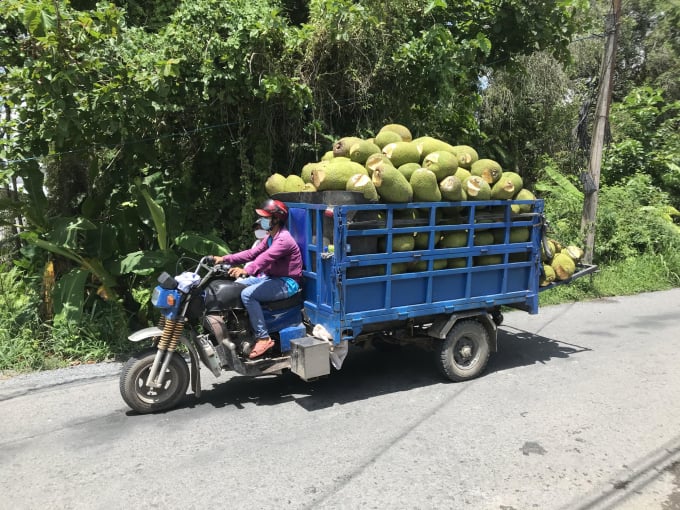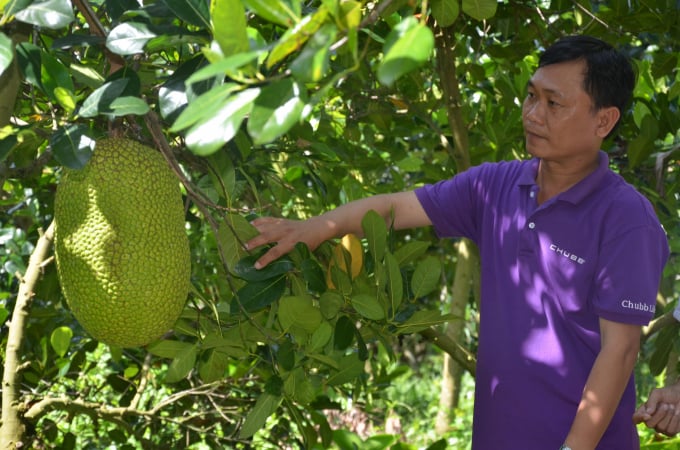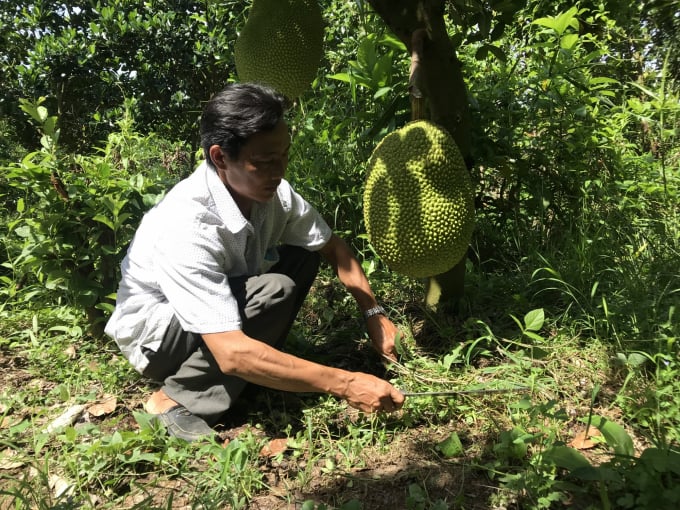June 15, 2025 | 05:09 GMT +7
June 15, 2025 | 05:09 GMT +7
Hotline: 0913.378.918
June 15, 2025 | 05:09 GMT +7
Hotline: 0913.378.918

Traders buy jackfruits in the Mekong Delta. Photo: Minh Dam.
In recent days, the increase inThai jackfruit prices have been good news in the fruit market in the Mekong Delta amid social distancing during the Covid-19 pandemic. The price reached a peak of VND52,000 per kilogram two weeks ago.
The farm-gate price of first-class Thai jackfruits is now VND30,000 per kilogram while the price of second-class fruits is VND20,000 per kilogram and the third-class fruits are sold at VND10,000 per kilogram.
According traders and wholesalers, the reason for the increase of Thai jackfruit prices in recent days is high demand in the Chinese market. In addition, the main harvest of many types of fruit is over at this time, so the supply of fruits is not abundant. Meanwhile, because many jackfruit processing plants well-implement "thee-on-spot", they need raw materials for operations.
In recent years, along with durian, dragon fruit, Thai jackfruit is a crop that brings a stable income to farmers because by growing jackfruit trees, farmers are able to harvest fruits all year round and no longer worried about oversupply.

Jackfruit tree is easy to grow and brings a stable income to farmers. Photo: Minh Dam.
Currently, the cultivation area of jackfruit trees, especially Thai jackfruit is expanding rapidly in the Mekong Delta. According to the Department of Crop Production, by 2020 there were above 30,000 hectares of jackfruit cultivation in the Mekong Delta, mainly concentrating in the provinces of Tien Giang and Hau Giang. Especially, Tien Giang has seen the sharp increase in the jackfruit growing areas. There are now 15,000 hectares of jackfruit trees in Tien Giang of which around 11,000 hectares are producing fruits.
In the Mekong Delta, many farming households chose jackfruit trees to grow on the area converted from ineffective rice fields and orchards because jackfruit trees are easy to grow and don't require much care.
However, according to the Department of Crop Production, many converted orchards are unqualified. Some orchards were not planted with qualified seeds and suitable techniques such growing trees at high density to make use of land, using too much fertilizers to maximize yield, abusing pesticides to kill pests and diseases.

Farmers are weeding before fertilizer application for jackfruit. Photo: Minh Dam.
In the summer-autumn crop of 2021, the rice planting area converted in the southern provinces was estimated at 27,394 hectares. Especially, the converted area in the Mekong Delta provinces was 23,816 hectares of which 6,420 hectares were converted into orchards, 20,620 hectares were converted into annual crops and the rest was used for aquaculture.
For jackfruit trees, farmer often grew at super high density of around 2.5 meter per tree, resulting in competition for nutrients and light. Therefore, many jackfruits had low quality and low prices. Above all, due to being early exploited most of jackfruit trees are in caducity and less sustainable.
Nguyen Minh Tan, a fruit wholesaler in Cai Lay town (Tien Giang province) said that if the orchards have high density, trees can't receive enough nutrients to grow and develop; consequently the fruits are small with big seed and thin flesh and taste is not good.
The issue that causes concern is that when a low quality product is put up for sale in the market, especially in the export markets, consumer will have bad impression on the product and then they develop a prejudice against that product. In addition, the Department of Crop Production also noted that organizing production and converting crops have not yet complied with planning and orientations of localities.
Therefore, it's necessary to enhance the link between production and purchasing to ensure the market for the products. The conversion of rice land into orchards requires huge capital investment; hence localities need to soon complete planning solutions and make plans on the conversion in association with the season, converted zones and consumption.
Translated by Mai Tham
/2025/06/12/3721-2-202745_83.jpg)
(VAN) TH made an impression at Seoul Food 2025 with its line of natural beverages, paving the way for Vietnamese food products to enter the South Korean market.

(VAN) Soc Trang's success in rice exports stems from a strategy of developing fragrant and specialty rice cultivation areas and standardizing production toward low-emission practices.
/2025/06/11/1311-5-120811_839.jpg)
(VAN) The pig farming industry is facing the challenge of comprehensive restructuring to meet requirements for quality, safety, traceability, and market expansion both domestically and for export.

(VAN) Vietnam considers participating in ALGROALBA in order to expand agricultural production, coordinate the assessment and effective exploitation potential land.
/2025/06/05/5314-1-184727_407.jpg)
(VAN) From seemingly worthless fish scales and skin, enzymes and lactic ferments can transform by-products into peptides, opening a sustainable, effective business direction and elevating Vietnamese seafood.

(VAN) TTC AgriS and IFC signed a strategic partnership to develop a sustainable agricultural value chain, aiming to achieve the Net Zero target by 2035.

(VAN) Seafood by-products are opening a new path, combining green growth and technological innovation to enhance the industry's value.